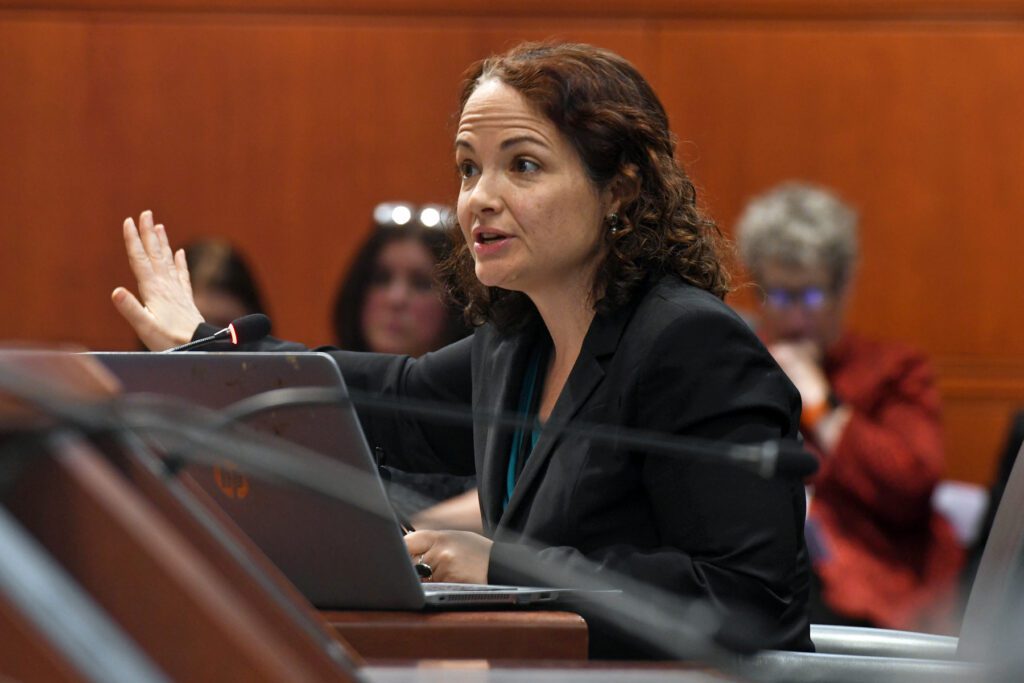
State Child Advocate Sarah Eagan speaks during a public hearing in front of the legislature in 2023. Eagan has issued her third in a year detailing how other state agencies failed to follow their own guidelines in cases involving the death of a child.
Ned Gerard/Hearst Connecticut MediaConnecticut’s education department faces a federal complaint alleging it has failed to properly monitor special education schools in the state.
The complaint, filed with the U.S. Office of Special Education Programs, stems from an investigation into High Road, a chain of special education schools operating across the state.
As part of the investigation, Connecticut’s Office of the Child Advocate and the non-profit Disability Rights Connecticut found that the state education department had identified significant issues at High Road but failed to follow up to ensure they were addressed. Additionally, the report found the agency had failed to collect annual assurances that High Road was complying with staffing and certification standards.
Article continues below this ad
In the federal complaint filed Thursday, the Office of the Child Advocate and Disability Rights Connecticut asked federal authorities to look into these concerns.
“It’s a continuing effort to resolve a central issue,” Sarah Eagan, the state’s child advocate, said Thursday. “Who is responsible for ensuring that kids with disabilities are appropriately served, whether in their school of origin or, in particular, when they have been out-placed into private, publicly funded programs like High Road?”
In a statement Thursday, education department spokesperson Matthew Cerrone said there is “neither a legal nor factual basis” for the federal complaint, questioning the “the reliability and accuracy” of the Office of the Child Advocate and Disability Rights Connecticut’s investigation into High Road.
“Connecticut remains committed to supporting students with disabilities, as evidenced by being one of (20) states to receive the highest rating for federal special education compliance,” Cerrone said.
Article continues below this ad
High Road is an approved private special education program that operates schools in Hartford, Norwalk, Wallingford and Killingly, serving students from 18 local school districts statewide, a disproportionate number of whom are Black and Latino.
In their investigation, conducted over three years and published in March, the Office of the Child Advocate and Disability Rights Connecticut found that High Road programs were frequently under-staffed and relied on instructors who lacked proper certification. In one instance, the report said, an “autism classroom” was staffed by a teacher with no certification to provide special education instruction.
Additionally, the investigation found that the schools frequently resorted to restraint and seclusion — physical interventions often criticized as dangerous for students and staff.
As part of their investigation, the Office of the Child Advocate and Disability Rights CT conducted site visits to High Road schools and reviewed extensive records relating to the program’s staffing, certification, policies and procedures, curriculum and more.
Article continues below this ad
A High Road spokesperson said the report “does not accurately reflect the academic and behavioral supports at our schools, which follow state and federal regulations and guidelines.”
In June, the Office of the Child Advocate and Disability Rights Connecticut filed a federal civil rights complaint against four Connecticut school districts that sent dozens of students to High Road — Hartford, Bridgeport, Waterbury and Stratford — alleging the districts had failed to ensure those students were receiving an adequate education.
Eagan said Thursday that while some of those districts have begun “accepting responsibility and making changes,” the state education department had not yet done so.
“Our position is their oversight is not adequate within the meaning of the law,” she said.
Article continues below this ad
Tom Cosker, an advocate with Disability Rights Connecticut, argued Thursday the state had failed to ensure students at High Road received a proper education from certified instructors.
“The system that they have in place is not sufficient,” he said. “When students go to these schools that claim to be specialized in providing services to these students with high needs, they would expect to have certified and qualified staff. And that has not always been the case.”
Documents obtained through a Freedom of Information request show the education department reviewed and re-approved the six active High Road schools in 2019 and 2020, finding that each program was operating in compliance with state rules.
The agency flagged several issues with a High Road school in New London, including a lack of proper screening for new staff. That program has since shut down.
Article continues below this ad
In his response to the federal complaint Thursday, Cerrone said the education department had “conducted a targeted, onsite off-cycle standards review” earlier this year in response to the investigation into High Road, which “called into question” the report’s findings.
Asked about this criticism, Eagan said her office stands by its findings, “which include hard data” on staff certification, missing background checks, chronic absence and more.

